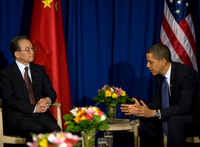Last week, senior students at the Naval War College presented their Final Exercise briefs. In assessing how the world of 2030 will take shape, many drew on the National Intelligence Council's report, "Global Trends 2025: A World Transformed," particularly its assessment -- as a "relative certainty" -- that "a global multipolar system is emerging with the rise of China, India, and others."
This is the future everyone expects, but in order to determine what steps the United States should take now, in 2010, to mold and nudge how this future will unfold, we need to answer a fundamental question: What sort of multipolar world do we want?
At first glance, the Obama administration appears to have ruled out the "concert of powers" approach to managing multipolarity. The United States instead remains committed to a 21st-century version of the "Open Door" policy, rejecting anything that would recognize "spheres of influence" or "zones of privileged interests" in the geographic neighborhoods of the other great powers. As Vice President Joe Biden reiterated in Kyiv in July 2009, "We don't recognize, and I want to reiterate this, any spheres of influence." Nor is it likely the current administration would embrace an updated version of Nixon's "regional policemen" idea -- having a major power assume the lead for ensuring stability and security in a specific region of the world.

